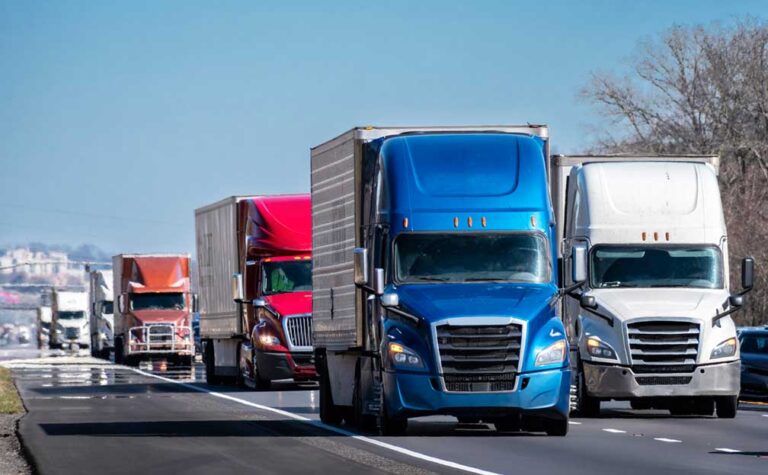U.S. sales of new Class 8 trucks were stronger than expected in September when 21,813 trucks were reported sold by manufacturers, according to Wards Intelligence. Strong truck sales would seem to be bad news for a freight market that’s plagued by overcapacity, keeping rates low.
There is, however, good news in the numbers.
Large numbers of the new trucks being sold are going to vocational purposes.
“The clean energy transition and AI are driving utility infrastructure investment, while government programs such as CHIPS and BIL have boosted public infrastructure and reshoring projects,” said Kenny Vieth, president and senior analyst at ACT Research.
The CHIPS and Science Act of 2022 (CHIPS) provides $50 billion for research, development and manufacture of silicone chips used in electronics and other applications. The Bipartisan Infrastructure Law (BIL), passed in November 2021, provides $1.2 trillion for infrastructure projects.
Those projects require trucks — and lots of them.
Grants for projects under these bills are just getting started and will continue for years. Companies involved in these construction projects are stocking up on equipment such as day-cab tractors to pull dump trailers and Class 8 trucks fitted with dump, concrete or other bodies.
OTR freight segment still awash with available tractors
The number of sleeper-equipped Class 8 tractors going to the freight hauling segment of trucking is declining, but at an excruciating low pace.
“The U.S. and Canadian tractor markets remain awash in capacity, allowing rates to rise only incrementally over the past year,” Vieth said. “The result has been for-hire carrier profitability at the lowest levels since the global financial crisis (2007-2008).”
Vieth describes current levels as “the current worst-in-15-years depression in carrier financial conditions.”
September is typically a big month for new truck orders as the next year’s models are announced in August.
FTR reports that preliminary North American Class 8 orders in September reached 30,000. That figure is way up from August but represents a decline of 4% from September of 2023. The figure was revised to 3,3000 units as more data came in.
Dan Moyer, FTR’s senior analyst/commercial vehicles, also points to the vocational market as a driver of the orders.
“The vocational market considerably outperformed the conventional sector, driving most of the month-over-month improvement,” Moyer said.
Carriers are still buying, but they’re not expanding their fleets.
“Despite stagnant freight markets, fleets continue to invest in new equipment, albeit at replacement demand levels in 2024 to date,” he said.
On the used Class 8 market, ACT Research reported a robust month, with dealers reporting an 11% increase over August and a 13% increase over September 2023 numbers. The average used truck was 11% cheaper than it was a year ago and about the same age with 4% more miles on it.
ACT’s Steve Tam, vice president and senior analyst says lower interest rates may have sparked some of the increase as well as confidence in freight rates.
Carriers ordered trailers in September, too, but not at the levels at which they ordered tractors.
FTR reported sales of 11,532 orders for new trailers, down 63% from September 2023. It was the worst September for trailer orders since 2016, the report said.
“This divergence suggests that some fleets are prioritizing spending on new power units over trailers, possibly due to reduced profitability or shifting trade cycles,” Moyer said.
OEM sales for September 2024
Freightliner led the way in U.S. new Class 8 truck sales in September, reporting movement of 8,137 units for a 6.3% increase over August sales. Compared with September 2023, sales increased 3.4%. For the year to date, Freightliner’s 64,286 trucks sold is 16.0% behind last year’s pace but good for 36.2% of the new Class 8 market in the U.S.
Daimler sibling Western Star topped sales of 1,000 for the second consecutive month, reporting 1,006 sold. Although the company’s 8,098 trucks sold represents just 4.6% of the U.S. Class 8 market year to date, the number represents a 40.4% increase over last year’s first nine months — the only percentage increase for any of the major truck manufacturers.
International is going in the other direction for the year to date, with 18,835 Class 8 trucks sold compared with 28,973 at the same point of 2023 — a decline of 35%. U.S. sales of 2,705 in September represented an increase of 3.6% over August but lagged behind September 2023 sales by 15.5%. The company has seen its market share drop from 14.3% a year ago to its current 10.6%.
Peterbilt reported 3,088 Class 8 trucks sold in September, just 27 fewer than in August (0.9%) and down 10.6% from September 2023 sales. For the year to date, Peterbilt ‘s 28,366 is 2.3% behind sales at the same point as last year, but as a share of the total Class 8 market has risen by 1.6% and currently sits at 16.0% for the year.
Kenworth’s 3,176 sold in September was 1.8% higher than its August sales and 5.9% higher than a year ago September. Year to date, the company has sold 27,491 Class 8 trucks, 15.5% of the total market for 2024 and 3.3% ahead of last year’s pace.
Volvo reported U.S. sales of 2,514 Class 8 trucks, up 44.9% from August’s sales numbers. For the year, 18,331 Class 8 Volvos have been sold, down 8.2% from last year at the same point. According to reports, 10.3% of the new Class 8 trucks sold this year have been Volvos, down 0.5% from the 2023 pace.
Mack took the largest sales drop in September with sales of 1,168 compared with 1,391 in August for a decline of 16.0%. Compared with September 2023 sales declined by 28.0%. For the year so far, Mack’s 11,898 sold represents an 11.9% decline from its 2023 pace for the first nine months. Its share of the Class 8 market remains the same as last year’s at 6.7%.
How truck sales finish out the final quarter of 2024 will help determine how 2025 will begin for carriers.
For freight rates to increase, more trucks must come out of the market — but that process may be delayed further if new truck sales remain strong.
Cliff Abbott is an experienced commercial vehicle driver and owner-operator who still holds a CDL in his home state of Alabama. In nearly 40 years in trucking, he’s been an instructor and trainer and has managed safety and recruiting operations for several carriers. Having never lost his love of the road, Cliff has written a book and hundreds of songs and has been writing for The Trucker for more than a decade.







